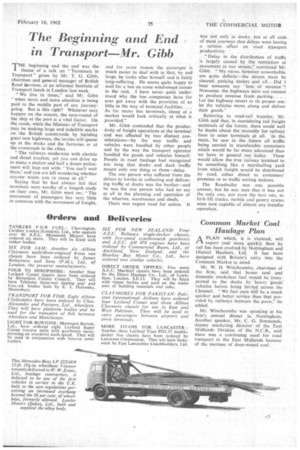The Beginning and End in Transport Mr. Gibb
Page 33

If you've noticed an error in this article please click here to report it so we can fix it.
TI-IE beginning and the end was the theme of a talk on "Terminals in Transport" given by Mr. T. G. Gibb, chairman and general manager of British Road Services, at an informal Institute of Transport lunch in London last week.
"We live in times," said Mr. Gibb "when more and more attention is being paid to the middle part of any journeygoing. But is this right? Whatever may happen on the oceans, the turn-round of the ship at the port is a vital factor. On the roads, while the Minister of Transport may be making large and indelible marks on the British countryside by building great new highways, the lorries still queue up at the docks and the factories or at the crossroads in the cities.
"The railways modernize with electric and diesel traction, yet you can drive up to many a station and half a dozen policement will leap out with: 'You can't wait there,' and you are left wondering whether anyone wants you to come at all."
Saying that he had always felt that terminals were worthy of a longish study on their own, Mr. Gibb went on:." The movement of passengers has very little in common with the movement of freight,
and for some reason the passenger is much easier to deal with in that, by and large, he looks after himself and is fairly long-suffering. He seems quite happy to wait for a bus on some wind-swept corner in the rain. I have never quite understood why the bus companies have for ever got away with the provision of so little in the way of terminal facilities.... As for many bus terminals, sheep at a market would look critically at what is provided."
Mr. Gibb contended that the productivity of freight operations at the terminal end was affected by two distinct considerations—by the way traffic and vehicles were handled by other people and by the way the transport operator handled the goods and vehicles himself. People in road haulage had recognized too long that docks and dock traffic meant only one thing to them—delay.
The one person who suffered from the delays to lorries in collecting and delivering traffic at docks was the haulier—and he was the one person who had no say at all in the planning and operation of the wharves, warehouses and sheds.
There was urgent need for action. It was not only, at docks, but at all ends of most journeys that delays were having a serious effect on road transport productivity.
"Delay in the distribution of traffic is largely caused by the restriction of movement in our streets," continued Mr. Gibb. "My views, however unworkable, are quite definite—the streets must be cleared, parking meters and all. • Did I hear someone say 'loss of revenue '? Nonsense, the highways were not treated to produce revenue from. parking. . . . Let the highway revert to its proper use; let the vehicles move along and deliver their goods."
Referring to road-rail transfer, Mr. Gibb said that, in considering rail freight terminals of the future, there could well he doubt about the necessity for railway lines to enter terminals at all. In the main, he saw in the future all traffic being carried in transferable containers which would be far more advanced than we have in general use today. These would allow the true railway terminal to be something like a marshalling yard from which freight would be distributed by road, either direct to customers' premises or to traffic sorting stations.
. The Roadrailer was one possible answer, but he was sure that it was not the only one, nor even the best one, as fork-lift trucks, mobile and gantry cranes were now capable of almost any transfer operation.












































































































